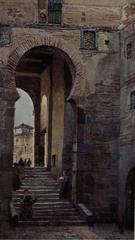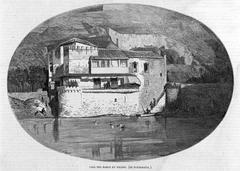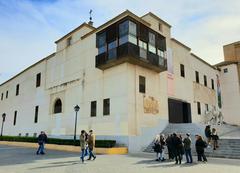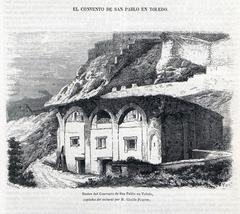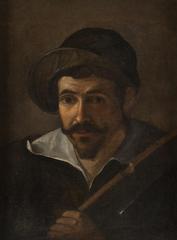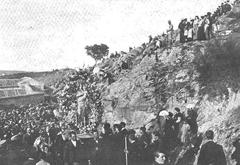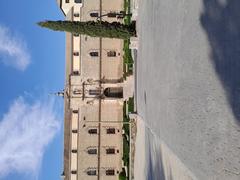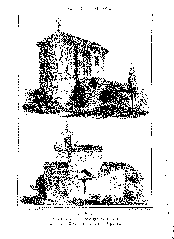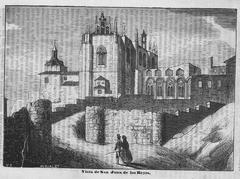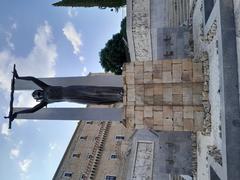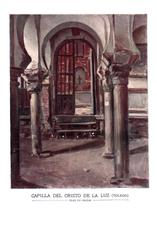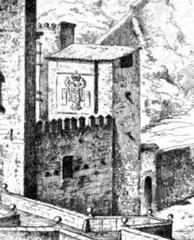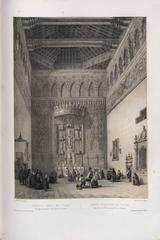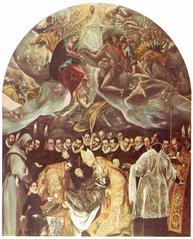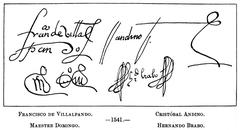Church of El Salvador, Toledo, Spain: Visiting Hours, Tickets, and Historical Sites Guide
Date: 04/07/2025
Introduction
Nestled in the heart of Toledo’s historic center, the Church of El Salvador stands as a testament to the city’s rich tapestry of Roman, Visigothic, Islamic, and Christian heritage. This remarkable monument has evolved through centuries, reflecting the unique multicultural legacy that defines Toledo. Its architectural features, such as the Visigothic pilaster, horseshoe arches, and a minaret-turned-bell tower, showcase an extraordinary blend of styles and faiths. Whether you are a history enthusiast, architecture lover, or a spiritual seeker, the Church of El Salvador offers an immersive journey through Toledo’s layered past. This guide provides comprehensive information on visiting hours, ticketing, accessibility, nearby attractions, and essential travel tips to help you fully experience the significance of this historical site (Toledo Monumental; Lions in the Piazza; Atlas Islamica).
Table of Contents
- Origins and Early Sacred Use
- Islamic Period: Mosque Construction and Urban Transformation
- Christian Reconquest and Medieval Transformations
- Late Medieval and Early Modern Developments
- Architectural Highlights
- Spiritual and Mystical Dimensions
- Visiting the Church of El Salvador: Practical Information
- Cultural Significance and Notable Events
- Nearby Attractions in Toledo
- Frequently Asked Questions (FAQ)
- Conclusion
- References
Origins and Early Sacred Use
The Church of El Salvador occupies a site considered sacred for nearly two millennia. Archaeological evidence points to Roman-era religious structures beneath the church, highlighting Toledo’s ancient importance (Toledo Monumental). The Visigoths later established a Christian basilica here, leaving behind a rare pilaster with scenes from the life of Christ—a significant relic of early Christian art (Madrid Traveling; Historias de Toledo).
Islamic Period: Mosque Construction and Urban Transformation
Following the Muslim conquest in the 8th century, the site transformed into a mosque during the 9th-century Umayyad era, expanding further in the 11th-century Taifa period (Wikipedia; Nomads Travel Guide). Unique features from this period include the southeast orientation towards Mecca and the horseshoe arches—hallmarks of Islamic architecture. The minaret, later adapted as the bell tower, remains a prominent symbol of this era (Religiana).
Christian Reconquest and Medieval Transformations
With King Alfonso VI’s reconquest of Toledo in 1085, the mosque was consecrated as a Christian church in 1159. The building incorporated Romanesque and Mudéjar elements—Christian structures adorned with Islamic decorative motifs—creating a distinctive aesthetic. The Mudéjar brickwork and tilework are especially notable (Historias de Toledo; Nomads Travel Guide).
Late Medieval and Early Modern Developments
A fire in the late 15th century led to the addition of the Gothic Chapel of Santa Catalina, introducing pointed arches and ribbed vaulting. The minaret evolved into a bell tower with Baroque features, harmonizing the church’s diverse architectural styles. Interiors were enriched with coffered ceilings, mirrors, and tapestries, reflecting continued artistic innovation (Religiana; Toledo Monumental).
Architectural Highlights
- Visigothic Pilaster: Intricately carved, depicting scenes from Christ’s life (Madrid Traveling).
- Horseshoe Arches: Iconic of its mosque era, these arches are visible throughout the nave.
- Minaret/Bell Tower: Once a minaret, now a bell tower topped with a Baroque chamber.
- Gothic Chapel of Santa Catalina: Noteworthy for its ribbed vaults and pointed arches.
- Mudéjar Details: Ornamental brickwork and tilework exemplify the cultural fusion.
Recent excavations have revealed Roman and Visigothic remnants, further enriching the visitor experience (Toledo Monumental).
Spiritual and Mystical Dimensions
The Church of El Salvador is reputedly built on a site of ancient telluric energy, selected by successive civilizations for its spiritual significance (Toledo Monumental). Many visitors comment on the tranquil, almost mystical atmosphere within the church.
Visiting the Church of El Salvador: Practical Information
Visiting Hours
- March to mid-October: 10:00 AM – 6:45 PM
- Mid-October to February: 10:00 AM – 5:45 PM
- Sundays and Holidays: Opening at 11:00 AM (hours may vary)
Closed on January 1st and December 25th (Tourism Castilla-La Mancha).
Ticket Prices
- General Admission: €3–€4 (varies by provider)
- Reduced Admission: €2–€2.40 (students, seniors, eligible groups)
- Children under 10–12: Free (age limit depends on ticket provider)
- Toledo Monumental Wristband: €9–€12, includes access to multiple monuments
Tickets can be purchased onsite, and some providers offer online booking. The Tourist Bracelet or Monumental Wristband is recommended for those planning to visit several sites (Lions in the Piazza; Spain Less Traveled).
Accessibility
Due to its historic structure, the church features uneven floors and steps. Wheelchair access is available at the main entrance, but interior access is limited. Visitors with mobility concerns should contact the site in advance for assistance.
Guided Tours
Daily guided tours are offered in English and Spanish. Advance booking is recommended, especially during peak season. Tours often provide valuable context regarding the church’s historical and architectural significance.
Travel Tips
- Wear comfortable footwear; Toledo’s old town is cobblestoned.
- Combine your visit with nearby attractions such as Iglesia de Santo Tomé and the Convento de Santa Úrsula.
- Early mornings or late afternoons are best for a quieter, more contemplative experience.
- Non-flash photography is permitted; please respect ongoing religious services.
Cultural Significance and Notable Events
The Church of El Salvador has played a key role in Spanish history. It is referenced in the classic novel “Lazarillo de Tormes” and served as the baptismal site of Queen Joanna of Castile and dramatist Francisco de Rojas Zorrilla (Nomads Travel Guide). Despite damage from fires and conflict, it remains a vibrant center of worship and cultural memory (Toledo Monumental).
Nearby Attractions in Toledo
- Church of Santo Tomé: Home to El Greco’s masterpiece “The Burial of the Count of Orgaz.”
- Convento de Santa Úrsula: Historic convent with notable architecture.
- Toledo Cathedral, Synagogue of Santa María la Blanca, and Monastery of San Juan de los Reyes: All within walking distance.
The church’s central location makes it an ideal part of any walking tour of Toledo’s UNESCO-listed old town (Live the World; Lonely Planet).
Frequently Asked Questions (FAQ)
Q: What are the Church of El Salvador’s visiting hours?
A: March to mid-October: 10:00 AM–6:45 PM; mid-October to February: 10:00 AM–5:45 PM. Sundays and holidays open at 11:00 AM. Closed January 1 and December 25.
Q: How much do tickets cost?
A: €3–€4 general admission, with reductions for students, seniors, and children. The Tourist Bracelet offers access to multiple sites for €9–€12.
Q: Are guided tours available?
A: Yes, in English and Spanish, with advance booking recommended.
Q: Is the church wheelchair accessible?
A: Partial accessibility at the entrance; interior access is limited due to steps and uneven floors.
Q: Can I take photos inside?
A: Non-flash photography is allowed.
Q: What other sites are nearby?
A: Church of Santo Tomé, Convento de Santa Úrsula, Toledo Cathedral, and more.
Conclusion
The Church of El Salvador is much more than a historical monument—it is a living chronicle of Toledo’s cultural synthesis and religious evolution. Its architectural diversity, from Roman columns and Visigothic reliefs to Islamic arches and Mudéjar brickwork, narrates the story of Toledo as a crossroads of civilizations. Centrally located and included in convenient monument passes, it is a must-see for anyone interested in Spain’s multicultural heritage. Plan your visit to immerse yourself in the spiritual, artistic, and historical richness of this extraordinary site.
For the latest updates, guided tours, and immersive digital content, download the Audiala app and follow official tourism sources.
References
- Toledo Monumental, ‘El Salvador: A Vortex of Ancient Energies’
- Madrid Traveling, ‘Churches in Toledo, Spain’
- Historias de Toledo, ‘Descubriendo Toledo: Iglesia del Salvador y su Historia’
- Wikipedia, ‘Mezquita-Iglesia de El Salvador, Toledo’
- Nomads Travel Guide, ‘Iglesia de El Salvador Toledo’
- Religiana, ‘Church of El Salvador Toledo’
- Lions in the Piazza, ‘Mosques, Synagogues & Churches in Toledo’
- Spain Less Traveled, ‘Toledo Spain Travel Guide’
- Tourism Castilla-La Mancha, ‘Iglesia de El Salvador de Toledo’
- Atlas Islamica, ‘Mosque-Church of El Salvador’
- World Heritage Sites, ‘Historic City of Toledo’
- Live the World, ‘Iglesia del Salvador Toledo’
- Lonely Planet, ‘Iglesia del Salvador’
